7下 Unit2(5)
外研版七年级英语下Module7 Unit2 课件 (共35张PPT)

Unit 2 I was born in Quincy
第二课时
阅读课文找出下列词组和句子。
• 1十二年前____1_2_y_e_a_r_s__a_g_o • 2在美国东海岸___o_n__th_e__e_a_s_t_c_o_ast of America • 3很多事情要做_l_o_t_s_o_f_t_h_i_n_g_s_t_o__d_o4很无聊__b_e__b_o_r_e_d___ • 5两个电影院____t_w_o__m__o_v_ie__t_h_e_a_te_r_s____ • 6两位美国总统____tw__o__p_r_e_si_d_e_n_t_s of the US • 7一个有许多树木的花园__a__g_a_r_d_e_n__w_i_t_h_l_o_t_s_o_f_t_r_e_e_s__ • 8在我卧室的墙上__o_n__m__y_b__e_d_r_o_o_m__walls • 9 有鱼的小湖____a_s_m__a_ll__la_k_e__w_i_t_h_f_i_sh in it
3. How many bedrooms were there?
A√. Three. B. Seven
4. Was there a garden?
√A. Yes, there was. B. No, there wasn’t.
1 一般过去时的标志词:①yesterday,yesterday morning/afternoon /evening ,the day before yesterday, ②last+表示时间的词,last week last year ,last month ③时间+ago,two days ago ④in+ 过去 的时间,in 2012 ⑤ in the past 2 用 be 动词的适当形式填空 Betty w__a_s___ born in Quincy twelve years ago . Betty __w__a_s_n_`t____( be not )bored in Quincy in the past . __W__e_r_e you at home yesterday afternoon ? There __w_e_r_e_n_`_t____(be not ) many rooms in his house last year . John Adams_w__a_s__ born in 1735 .
(完整版)广州深圳新牛津版教材七年级下册Unit2知识点小结
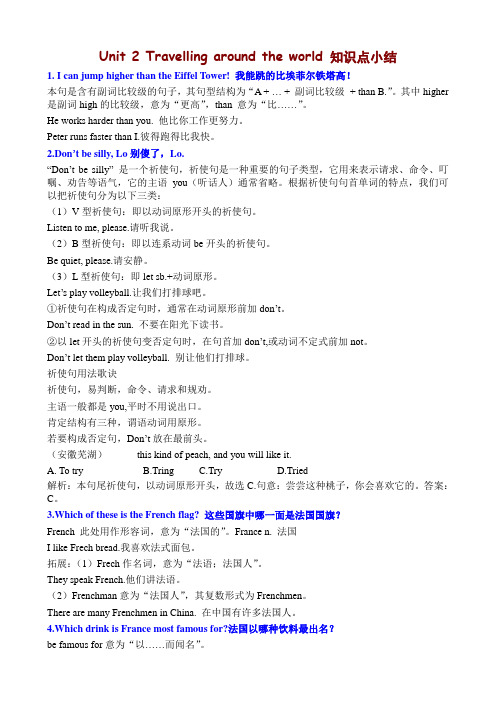
Unit 2 Travelling around the world 知识点小结1. I can jump higher than the Eiffel Tower! 我能跳的比埃菲尔铁塔高!本句是含有副词比较级的句子,其句型结构为“A + … + 副词比较级+ than B.”。
其中higher 是副词high的比较级,意为“更高”,than 意为“比……”。
He works harder than you. 他比你工作更努力。
Peter runs faster than I.彼得跑得比我快。
2.Don’t be silly, Lo别傻了,Lo.“Don’t be silly”是一个祈使句,祈使句是一种重要的句子类型,它用来表示请求、命令、叮嘱、劝告等语气,它的主语you(听话人)通常省略。
根据祈使句句首单词的特点,我们可以把祈使句分为以下三类:(1)V型祈使句:即以动词原形开头的祈使句。
Listen to me, please.请听我说。
(2)B型祈使句:即以连系动词be开头的祈使句。
Be quiet, please.请安静。
(3)L型祈使句:即let sb.+动词原形。
Let’s play volleyball.让我们打排球吧。
①祈使句在构成否定句时,通常在动词原形前加don’t。
Don’t read in the sun. 不要在阳光下读书。
②以let开头的祈使句变否定句时,在句首加don’t,或动词不定式前加not。
Don’t let them play volleyball. 别让他们打排球。
祈使句用法歌诀祈使句,易判断,命令、请求和规劝。
主语一般都是you,平时不用说出口。
肯定结构有三种,谓语动词用原形。
若要构成否定句,Don’t放在最前头。
(安徽芜湖)______this kind of peach, and you will like it.A. To tryB.TringC.TryD.Tried解析:本句尾祈使句,以动词原形开头,故选C.句意:尝尝这种桃子,你会喜欢它的。
人教版初一七年级英语(下)第二单元Unit2知识点+语法整合
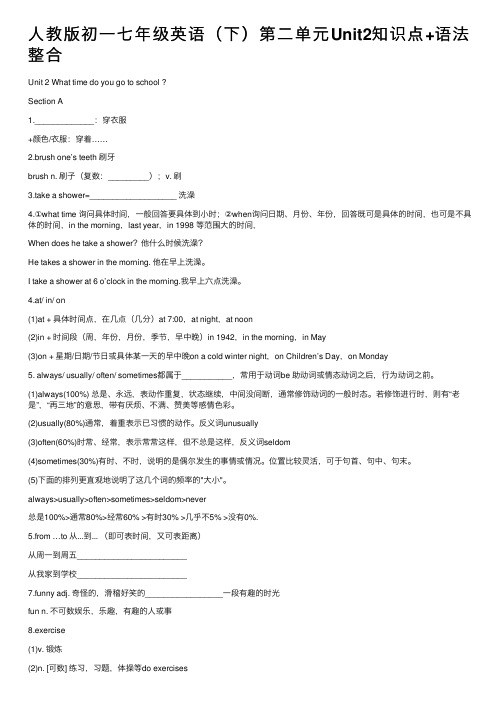
⼈教版初⼀七年级英语(下)第⼆单元Unit2知识点+语法整合Unit 2 What time do you go to school ?Section A1._____________:穿⾐服+颜⾊/⾐服:穿着……2.brush one’s teeth 刷⽛brush n. 刷⼦(复数:_________);v. 刷3.take a shower=___________________ 洗澡4.①what time 询问具体时间,⼀般回答要具体到⼩时;②when询问⽇期、⽉份、年份,回答既可是具体的时间,也可是不具体的时间,in the morning,last year,in 1998 等范围⼤的时间,When does he take a shower?他什么时候洗澡?He takes a shower in the morning. 他在早上洗澡。
I take a shower at 6 o’clock in the morning.我早上六点洗澡。
4.at/ in/ on(1)at + 具体时间点,在⼏点(⼏分)at 7:00,at night,at noon(2)in + 时间段(周,年份,⽉份,季节,早中晚)in 1942,in the morning,in May(3)on + 星期/⽇期/节⽇或具体某⼀天的早中晚on a cold winter night,on Children’s Day,on Monday5. always/ usually/ often/ sometimes都属于___________,常⽤于动词be 助动词或情态动词之后,⾏为动词之前。
(1)always(100%) 总是、永远,表动作重复,状态继续,中间没间断,通常修饰动词的⼀般时态。
若修饰进⾏时,则有“⽼是”,“再三地”的意思,带有厌烦、不满、赞美等感情⾊彩。
(2)usually(80%)通常,着重表⽰已习惯的动作。
七年级下册英语人教版u2课文
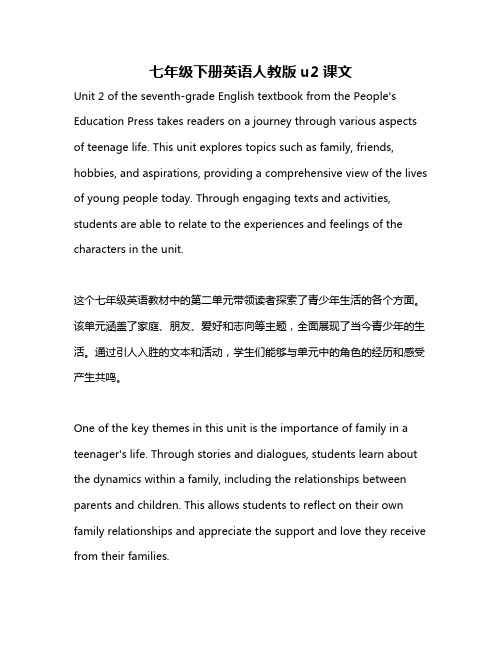
七年级下册英语人教版u2课文Unit 2 of the seventh-grade English textbook from the People's Education Press takes readers on a journey through various aspects of teenage life. This unit explores topics such as family, friends, hobbies, and aspirations, providing a comprehensive view of the lives of young people today. Through engaging texts and activities, students are able to relate to the experiences and feelings of the characters in the unit.这个七年级英语教材中的第二单元带领读者探索了青少年生活的各个方面。
该单元涵盖了家庭、朋友、爱好和志向等主题,全面展现了当今青少年的生活。
通过引人入胜的文本和活动,学生们能够与单元中的角色的经历和感受产生共鸣。
One of the key themes in this unit is the importance of family in a teenager's life. Through stories and dialogues, students learn about the dynamics within a family, including the relationships between parents and children. This allows students to reflect on their own family relationships and appreciate the support and love they receive from their families.该单元中的一个重要主题是家庭在青少年生活中的重要性。
Unit 2【复习课件】七年级英语下册单元复习(牛津译林版)

单词
1. neighbour n. (=neighbor) 邻居 2. will modal v. 将, 将会 3. visitor n. 访问者, 参观者→ _____v_is_it__v. 参观, 访问 4. like prep. 像, 类似; ……怎么样 → _______li_k_e v. 喜欢 5. notice n. 布告, 通知 6. information n. 信息 7. below adv. 下面 8. better adj. 较好, 更好 9. anything pron. 任何事 10. group n. 组, 群
3. They ____h_e_l_p__ us ____w_i_t_h__ all kinds of problems. 他们帮助我们解决各种问题。
4. There’s ____s_o_m_e_t_h_i_n_g__ ___w__r_o_n_g_ _____w_i_th__ my computer. 我的电脑出问题了。
7. It ___w_i_l_l ___ rain this afternoon. 今天下午将要下雨。
8. I ____w_i_ll___ take an umbrella with me. 我将随身带把伞。
9. —___S_h_a_l_l __ we go? 我们将会去吗? —Yes, we will./ —No, we will not. 是的, 我们将会去。/ 不, 我们将不会去。
短语
10. 办公室职员, 上班族 11. 警察局 12. 乘火车/ 公交车/ 轮船/ 自行车 13. 邮局 14.为……担心 15. 感到舒服
office worker police station by train/ bus/ ship/ bike post office worry about fell well
2023年外研版七年级英语下册Module 5 Unit 2习题(附答案)
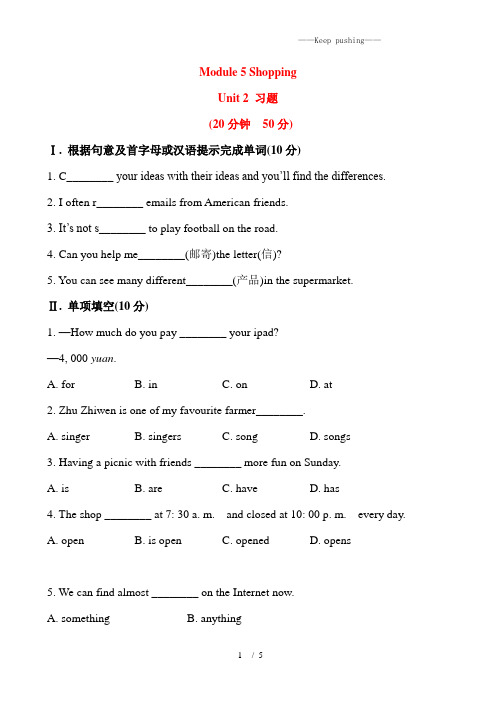
Module 5 ShoppingUnit 2 习题(20分钟50分)Ⅰ. 根据句意及首字母或汉语提示完成单词(10分)1. C________ your ideas with their ideas and you’ll find the differences.2. I often r________ emails from American friends.3. It’s not s________ to play football on the road.4. Can you help me________(邮寄)the letter(信)?5. You can see many different________(产品)in the supermarket.Ⅱ. 单项填空(10分)1. —How much do you pay ________ your ipad?—4, 000 yuan.A. forB. inC. onD. at2. Zhu Zhiwen is one of my favourite farmer________.A. singerB. singersC. songD. songs3. Having a picnic with friends ________ more fun on Sunday.A. isB. areC. haveD. has4. The shop ________ at 7: 30 a. m. and closed at 10: 00 p. m. every day.A. openB. is openC. openedD. opens5. We can find almost ________ on the Internet now.A. somethingB. anythingC. nothingD. everythingⅢ. 句型转换(10分)1. One day people will go to the shops no more. (改为同义句)One day people ______ go to the shops ______ more.2. Mary pays 100 dollars for the toy. (改为同义句)Mary ______ 100 dollars ______ the toy.3. Lingling is going to buy a present for her mother. (对画线部分提问)______is Lingling going to ______ for her mother?4. There are some new ways to go shopping nowadays. (改为一般疑问句, 并作出肯定回答)—________ _________ _______ new ways to go shopping nowadays?—________, ________ ________.5. Online shopping is good for our life. (用bad改为选择疑问句)________ online shopping good ________ ________ for our life?Ⅳ. 补全对话(10分)从方框中选择最佳选项完成对话, 有两项多余。
Module 5 Unit 2【课件】七年级英语下册(外研版)
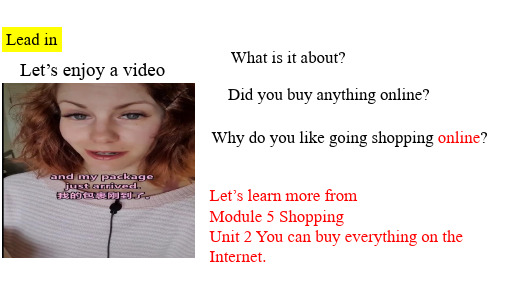
Retell
How to shop online
Advantages
Disadvantages
Changing our way of life
➢ First, you choose something, such as…, and pay for it. ➢ Then you receive ...
Pre-reading Do you like shopping? Where do you often go shopping?
How many ways of shopping do you know?
window shopping
TV shopping
Which shopping way do you like best? Why?
Adv.后来, 以后
总有一天
几乎;差不多
He is studying over the One day ,your dream We can buyalmostanything
Internet. 通过;超过 will come true.
on the Internet.
Let’s come to the passage.
3. Read carefully and check the sentences. 1. Online shopping is a new way of shopping. 2. You pay for online shopping before you receive it. 3. Online shopping is very dieffaicsuylt. 4. It's ivsenr'yt safe to shop over the Internet. 5. Our way of life is changing because of online shopping.
仁爱英语七下课文翻译(完整版)2
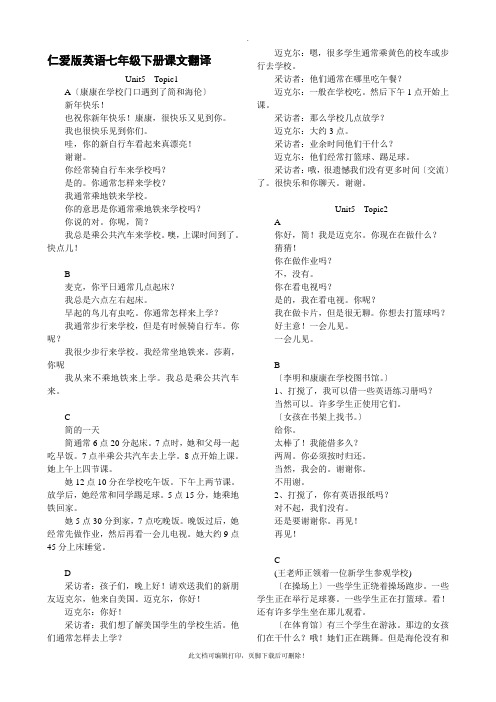
仁爱版英语七年级下册课文翻译Unit5 Topic1A〔康康在学校门口遇到了简和海伦〕新年快乐!也祝你新年快乐!康康,很快乐又见到你。
我也很快乐见到你们。
哇,你的新自行车看起来真漂亮!谢谢。
你经常骑自行车来学校吗?是的。
你通常怎样来学校?我通常乘地铁来学校。
你的意思是你通常乘地铁来学校吗?你说的对。
你呢,简?我总是乘公共汽车来学校。
噢,上课时间到了。
快点儿!B麦克,你平日通常几点起床?我总是六点左右起床。
早起的鸟儿有虫吃。
你通常怎样来上学?我通常步行来学校,但是有时候骑自行车。
你呢?我很少步行来学校。
我经常坐地铁来。
莎莉,你呢我从来不乘地铁来上学。
我总是乘公共汽车来。
C简的一天简通常6点20分起床。
7点时,她和父母一起吃早饭。
7点半乘公共汽车去上学。
8点开始上课。
她上午上四节课。
她12点10分在学校吃午饭。
下午上两节课。
放学后,她经常和同学踢足球。
5点15分,她乘地铁回家。
她5点30分到家,7点吃晚饭。
晚饭过后,她经常先做作业,然后再看一会儿电视。
她大约9点45分上床睡觉。
D采访者:孩子们,晚上好!请欢送我们的新朋友迈克尔,他来自美国。
迈克尔,你好!迈克尔:你好!采访者:我们想了解美国学生的学校生活。
他们通常怎样去上学?迈克尔:嗯,很多学生通常乘黄色的校车或步行去学校。
采访者:他们通常在哪里吃午餐?迈克尔:一般在学校吃。
然后下午1点开始上课。
采访者:那么学校几点放学?迈克尔:大约3点。
采访者:业余时间他们干什么?迈克尔:他们经常打篮球、踢足球。
采访者:哦,很遗憾我们没有更多时间〔交流〕了。
很快乐和你聊天。
谢谢。
Unit5 Topic2A你好,简!我是迈克尔。
你现在在做什么?猜猜!你在做作业吗?不,没有。
你在看电视吗?是的,我在看电视。
你呢?我在做卡片,但是很无聊。
你想去打篮球吗?好主意!一会儿见。
一会儿见。
B〔李明和康康在学校图书馆。
〕1、打搅了,我可以借一些英语练习册吗?当然可以。
许多学生正使用它们。
- 1、下载文档前请自行甄别文档内容的完整性,平台不提供额外的编辑、内容补充、找答案等附加服务。
- 2、"仅部分预览"的文档,不可在线预览部分如存在完整性等问题,可反馈申请退款(可完整预览的文档不适用该条件!)。
- 3、如文档侵犯您的权益,请联系客服反馈,我们会尽快为您处理(人工客服工作时间:9:00-18:30)。
唐家泊中学七年级英语学科教学案导学案
主备人卢凤莲课型New 课时安排Period
4
课题I’m going to study computer science Section B( 1a-1e)
学情
分析
教材分析能听懂用be going to结构谈论未来打算的对话,并能用该结构谈论未来的打算。
通过谈论未来的打算,引导学生学会给自己制定目标,并能为之付出努力。
导学案教学案
学习目标笔头掌握以下句型:
-What are you going to do
next year? –Well, I’m
going to take guitar
lessons.
2. 熟练掌握以下词汇:
resolution, team, foreign
3. 进一步熟练掌握be going
to结构的用法。
教学
目标
笔头掌握以下句型:
-What are you going to do next year?
–Well, I’m going to take guitar
lessons.
2. 熟练掌握以下词汇: resolution,
team, foreign
3. 进一步熟练掌握be going to结构的
用法。
学习重难点打算做某事,将要做某事
Be going to do sth
教学
重
难点
打算做某事,将要做某事
Be going to do sth
学法主动读记单词、自觉捕捉听力
中的关键词、听后跟读、读用
重点句型
教法任务型教学
学具
准备白板、录音机教具
准备
白板,录音机
学习任务教学过程
一、导入(启发探究 3分钟)
预习12页的1a,根据图片和文字信息,New Year’s resolutions的汉语意思是。
把图片和相应的New Year’s resolutions搭配好,大声朗读这些短语,同伴互相正音
你打算做啥,怎样实现?
II.你是个有目标的人吗?有目标才会有动力,请为自己设计近期和远期的奋斗目标吧!I. Revision
1. Review some words and phrases they learned yesterday.
你是个有目标的人吗?有目标才会有动力,请为自己设计近期和远期的奋斗目标
吧!
Next week,
Next term,
1
Next week,
Next term,
Next year,
二、自学(6分钟)认读并书写本课单词
把1a翻译成汉语
Learn to play the piano
Make the soccer team
Get good grades
Eat healthier food
Get lots of exercise
三、交流(合作探究 10分钟)
1、听录音,完成1c答案。
2、听录音,完成1d部分的句子并相互核对答案。
3.预习1d对话
朗读1d对话:
小组分角色大声朗读1d对话
替换部分词组再分角色大声朗读1d对话
四、总结(引深探究 15分钟)
--What are you going to do with the new student?
--We’re going to…
--Sounds interesting./Good idea
Report like this: In our group, we are going to…________________________________________ 【趁热打铁】
1. It ‘s impor tant for a student to learn a
f language well.
2. All the students should make their New Year’s r at the beginning of the year.
3. Everyone should s water.
4. What i do you play in the band?
5. Tom’s family isn’t r . But he
believes he can make much money by himself in the future.
五、堂堂清:
II. 句型转换。
1. He is going to move to New York. (对划
线部分提问)
is he going to ?
2. He often gets to school early in the morning
(用tomorrow改写句子)
He to
school early tomorrow. Next year,
II. Listening
1、听录音,完成1c答案。
2、听录音,完成1d部分的句子并相互核对答案。
--What are you going to do with the new student?
--We’re going to…
--Sounds interesting./Good idea
Report like this: In our group, we are going
to…_________________________________ III. Pair work
Ss act the conversation in pairs. Ask some pairs to act out their conversations.
V. Role-play
1. Read the conversations and match the name with the right shows.
擅长写故事
继续做不要担心
成为一位作家上完大学
搬到上海去烹饪学校
2. Practice the conversation with their
partner. Then let some pairs to act out the conversation.
VI. Homework:
1. It ‘s impor tant for a student to learn a f language well.
2. All the students should make their New Year’s r at the beginning of the year.
3. Everyone should s water.
4. What i do you play in the band?
5. Tom’s family isn’t r . But
he believes he can make much money by himself in the future.
2
3. The students are going to the party
tonight.(改为否定句)
The students
to the party tonight.
4. I agree with what you said.(改为一般疑
问句)
you with what I said?
5. I’m going to make the soccer team.(对
划线部分提问)
are you ?VI. Homework:
1. 分别写出Lucy, Kim和Mike的新年打算。
2. 列举出你们组要为Lucy, Kim和Mike做的事
情。
3. 依据下个学案的学习目标,做好课前准备。
板书设计:
Learn to play the piano
Make the soccer team
Get good grades
Eat healthier food
Get lots of exercise
3。
